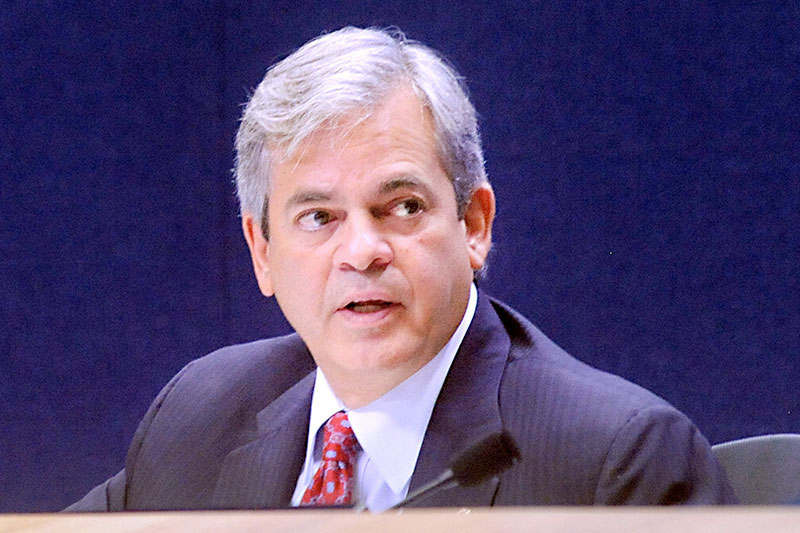State of the City 2016
Mayor Steve Adler declares Austin “prosperous, strong … and cool”
By Michael King, 9:00AM, Fri. Feb. 19, 2016
There were no great surprises in the mayor’s “State of the City” address Tuesday night at Zachary Scott’s Topfer Theatre – although a brief audience protest and disruption near its close caused a bit of confusion. Adler proposed several affordability and mobility projects, and reiterated: “Great Cities Do Big Things.”
On the whole, Mayor Adler’s second SOTC oration was slightly less ambitious (and shorter) than the first, delivered last April in the Austin ISD Performing Art Center (a bigger venue than the Topfer). There was a little more audible haste in preparation – the mayor was still reverberating from his recent attempt to find a middle way in the months' long wrangle over transportation network companies (i.e., Uber and Lyft), and though he (thankfully) spent only a little more time on that subject, he was winnowing his text on the wing and his musings were a bit more scattered than last year’s.
The mayor was introduced by UT-Austin President Gregory Fenves – unremarkably, except in Fenves’ tone-deaf citation of the city’s 1928 Master Plan as a model of urban visionary thinking, apparently unaware that among most Austinites it has become a baleful symbol of the city’s formal institutionalization of segregation, and of moving minority populations to the Eastside. The gaffe did provide a certain irony later in Adler’s talk, when he listed his “Spirit of East Austin” initiative, begun last year, as a major focus of his office for 2016: “The Spirit of East Austin seeks to combat the effects of historical and intentional inequitable policies and practices, as well as the results of what is at best, benign neglect.”
But that slightly sour note was quickly forgotten amidst the mayor’s characteristic optimism, initially in ritually reciting Austin’s strengths, as the occasion demands: “We are working … We are prosperous … We are safe … We are innovative … We are green … We are also a pretty good-looking bunch.” The first five were bolstered with the requisite statistics; the sixth was the fruit of one of those laughable media surveys (this one from CNN) purporting to show that “Austin is home to America’s 7th-most attractive residents.”
That was of a piece with another passing citation of Paper City magazine, and Forbes: “Austin’s just as cool as it thinks it is.”
But the mayor could justly say that the city’s economy is strong, the crime rate is relatively low, and City Council (this one and its predecessors) has done its best to implement wind and solar energy investments that have put the city ahead of the curve on renewables. He didn't ignore darker matters – noting the recent police shooting of 17-year-old David Joseph – but the main burdens of the speech were what have we done well, what do we hope to do better.
You can read the mayor's prepared text (from which he detoured quite a bit) or see the speech as delivered at mayoradler.com, a boosterish new web site compiling mayoral accomplishments and communicating with residents.
The overarching theme of the evening was the mayor’s newest new slogan: “Great cities do big things not because they are great. Cities become great because they do big things.” He noted that the FY2016 city budget had saved the average homeowner $14.00 – worthy enough but, as he said, not an accomplishment fit for an official gravestone – and said that going forward, he hoped to inspire and enact larger projects in two major categories: improving the city’s overall transportation mobility, and chipping away at the economic inequality most commonly referred to as the “affordability crisis.”
It’s worth noting that rather than inaccurately describing Austin as the “most economically segregated city in the country” – as he has habitually recited since the appearance of last year’s “Segregated City” report from the University of Toronto – the mayor corrected the judgment to describe our much larger problem, materially and politically: “We live in the most economically segregated metropolitan area in the country.” Far too much of that relative wealth – while generated and earned in Austin – resides outside the city limits, mostly beyond the equitable reach of city government.
The capacity crowd largely appreciated the mayor’s self-deprecating jokes and asides, but there was a small group of about a dozen audience members who apparently arrived early, sat together up high, and waited surprisingly long – the hour-long speech was nearly concluded – when they stood and drowned out the address by chanting, “Less talk! More action!”
Even to people in the immediate vicinity it was difficult to determine their cause (or the words on the large banner they unrolled). The mayor, blinded by the theater lights, was baffled. They soon left in an orderly fashion, and the reporters’ grapevine finally delivered an identification: “#ICEoutofAustin,” a campaign allied with Grassroots Leadership and dedicated to ending any city of Austin (and Austin police) cooperation with federal immigration agents. A GL press release issued almost simultaneously described the protesters (inaccurately) as having chanted “Not one more!” – the group accuses the mayor of not acting sufficiently to formally end all city cooperation with immigration authorities.
“We are asking you again, this time publicly,” read the press release, “to do everything in your power as the progressive mayor of a city whose residents have repeatedly called for an end to deportations, to put forth a resolution that finally draws a bright line between the Austin Police Department and federal immigration agents.”
The protest was loud, but brief and otherwise polite, although it did serve to overshadow the mayor’s peroration. Summarizing his big goals for 2016, he said: “These will be significant focuses of my time this year: affordability, mobility, the Spirit of East Austin, job training, permitting, and Austin Energy. We will better make Austin affordable for the people who live in Austin and set into motion real and meaningful solutions. We will realize opportunities by righting past wrongs, and turn congested eye sores and clogged corridors into healthy arteries and ways for you to get to work and to get home.”
He then threw in a few other hopeful projects for good measure, and noted: “Big things take time. Rome was not built in a day …”
Got something to say on the subject? Send a letter to the editor.
A note to readers: Bold and uncensored, The Austin Chronicle has been Austin’s independent news source for over 40 years, expressing the community’s political and environmental concerns and supporting its active cultural scene. Now more than ever, we need your support to continue supplying Austin with independent, free press. If real news is important to you, please consider making a donation of $5, $10 or whatever you can afford, to help keep our journalism on stands.
Michael King, April 18, 2019
June 12, 2024
May 4, 2024
State of the City 2016, Steve Adler, Grassroots Leadership











